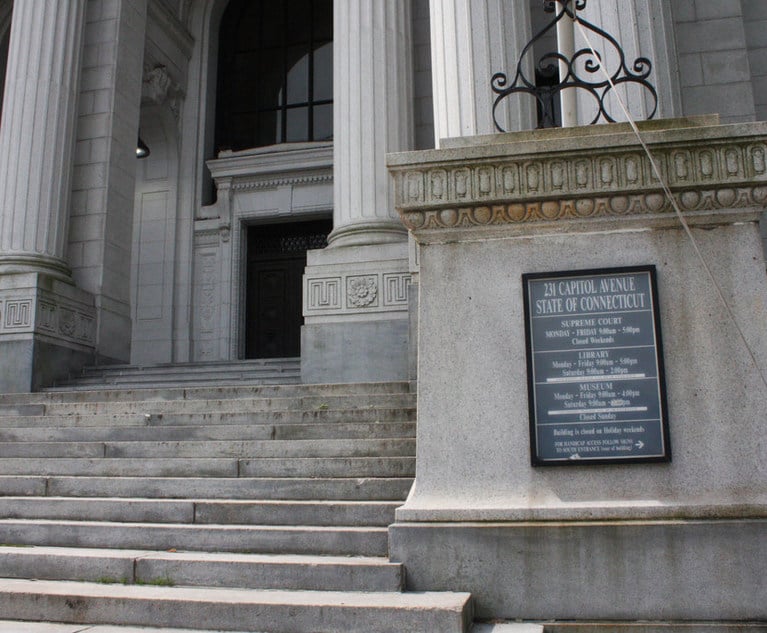Limit Deadline to 30 Days for Judicial Decisions on Motions
The delays in obtaining a hearing date in family court are unacceptable for a variety of reasons including: the potential for a parent to be deprived of financial support and parents being deprived of meaningful access to minor children.
September 30, 2019 at 01:35 PM
3 minute read
 Editor's note: This editorial is the first in a two-part series. Read the second installment here.
Editor's note: This editorial is the first in a two-part series. Read the second installment here.
Section 11-19 of the Connecticut Rules of Court provides that a trial judge is required to issue a decision on a short calendar matter not later than 120 days after the conclusion of the hearing of that matter unless there is a waiver of that deadline. A proposal is presently pending before the Rules Committee whereby that deadline will be shortened to 30 days for short calendar matters in the family court. That amendment is clearly warranted in family matters.
As this board has recently suggested, the delays in obtaining a hearing date in family court are unacceptable for a variety of reasons including: the potential for a parent to be deprived of financial support and parents being deprived of meaningful access to minor children, sometimes for months, pending a scheduled hearing on a "date certain" after a motion first appears on the short calendar. Those same concerns underlie the proposed amendment to Section 11-19 of the Practice Book. In fact, the combination of unacceptable delays obtaining a hearing coupled with the delays of up to 120 days to obtain a court decision is simply intolerable and seriously undermines the effectiveness of the entire judicial process.
The proposal to limit the deadline for a judicial decision on a short calendar motion in family court to 30 days is particularly important for families facing the frequently disruptive and emotionally upsetting realities of separation and divorce. Allowing judges up to four months to issue a decision after a short calendar hearing unacceptably exacerbates the disruption, stress and uncertainty associated with prolonging the resolution of such essential issues. In fact, it is difficult to conceive of a reason why a judge in any court should not render a decision on a short calendar motion within 30 days. If, however, the matter involves extensive testimony and days of hearings, a waiver provision could be appropriate.
We would further encourage this rule change to require the court to hold a hearing on any scheduled pendente lite or post-judgment contempt matter within 14 days of the date it is "Ready" on the calendar. Effectively, that would mean the seemingly endless delays described herein would be time limited to no more than 45 days from when a party wants to be heard to the date of a decision rendered.
Shortening the time to get a hearing and the deadline for rendering such a decision in short calendar matters, however, is only part of the solution. Because Practice Book §11-19(a) allows a party to seek assignment of the matter to another judge if a decision is not rendered within the requisite time period, this aspect of the rule should also be addressed. Because of the importance of obtaining a prompt decision from the judge who conducted the hearing, it is likewise essential for the judicial branch to adopt policies whereby our judges are strongly encouraged to issue decisions on short calendar matters. To the extent a decision is not made within the time period required, any reassignment or rehearing should be given priority, and scheduling should be expedited.
This content has been archived. It is available through our partners, LexisNexis® and Bloomberg Law.
To view this content, please continue to their sites.
Not a Lexis Subscriber?
Subscribe Now
Not a Bloomberg Law Subscriber?
Subscribe Now
NOT FOR REPRINT
© 2025 ALM Global, LLC, All Rights Reserved. Request academic re-use from www.copyright.com. All other uses, submit a request to [email protected]. For more information visit Asset & Logo Licensing.
You Might Like
View All
Coerced Confessions and the Burden of Proof Beyond Reasonable Doubt


35 Years After CT's Affordable Housing Act, Progress Remains a Struggle
4 minute readTrending Stories
- 1Coral Gables Attorney Busted for Stalking Lawyer
- 2Trump's DOJ Delays Releasing Jan. 6 FBI Agents List Under Consent Order
- 3Securities Report Says That 2024 Settlements Passed a Total of $5.2B
- 4'Intrusive' Parental Supervision Orders Are Illegal, NY Appeals Court Says
- 5Federal Laws Also Preempt State's Swipe Fee Law on Out-of-State Banks, Judge Rules
Who Got The Work
J. Brugh Lower of Gibbons has entered an appearance for industrial equipment supplier Devco Corporation in a pending trademark infringement lawsuit. The suit, accusing the defendant of selling knock-off Graco products, was filed Dec. 18 in New Jersey District Court by Rivkin Radler on behalf of Graco Inc. and Graco Minnesota. The case, assigned to U.S. District Judge Zahid N. Quraishi, is 3:24-cv-11294, Graco Inc. et al v. Devco Corporation.
Who Got The Work
Rebecca Maller-Stein and Kent A. Yalowitz of Arnold & Porter Kaye Scholer have entered their appearances for Hanaco Venture Capital and its executives, Lior Prosor and David Frankel, in a pending securities lawsuit. The action, filed on Dec. 24 in New York Southern District Court by Zell, Aron & Co. on behalf of Goldeneye Advisors, accuses the defendants of negligently and fraudulently managing the plaintiff's $1 million investment. The case, assigned to U.S. District Judge Vernon S. Broderick, is 1:24-cv-09918, Goldeneye Advisors, LLC v. Hanaco Venture Capital, Ltd. et al.
Who Got The Work
Attorneys from A&O Shearman has stepped in as defense counsel for Toronto-Dominion Bank and other defendants in a pending securities class action. The suit, filed Dec. 11 in New York Southern District Court by Bleichmar Fonti & Auld, accuses the defendants of concealing the bank's 'pervasive' deficiencies in regards to its compliance with the Bank Secrecy Act and the quality of its anti-money laundering controls. The case, assigned to U.S. District Judge Arun Subramanian, is 1:24-cv-09445, Gonzalez v. The Toronto-Dominion Bank et al.
Who Got The Work
Crown Castle International, a Pennsylvania company providing shared communications infrastructure, has turned to Luke D. Wolf of Gordon Rees Scully Mansukhani to fend off a pending breach-of-contract lawsuit. The court action, filed Nov. 25 in Michigan Eastern District Court by Hooper Hathaway PC on behalf of The Town Residences LLC, accuses Crown Castle of failing to transfer approximately $30,000 in utility payments from T-Mobile in breach of a roof-top lease and assignment agreement. The case, assigned to U.S. District Judge Susan K. Declercq, is 2:24-cv-13131, The Town Residences LLC v. T-Mobile US, Inc. et al.
Who Got The Work
Wilfred P. Coronato and Daniel M. Schwartz of McCarter & English have stepped in as defense counsel to Electrolux Home Products Inc. in a pending product liability lawsuit. The court action, filed Nov. 26 in New York Eastern District Court by Poulos Lopiccolo PC and Nagel Rice LLP on behalf of David Stern, alleges that the defendant's refrigerators’ drawers and shelving repeatedly break and fall apart within months after purchase. The case, assigned to U.S. District Judge Joan M. Azrack, is 2:24-cv-08204, Stern v. Electrolux Home Products, Inc.
Featured Firms
Law Offices of Gary Martin Hays & Associates, P.C.
(470) 294-1674
Law Offices of Mark E. Salomone
(857) 444-6468
Smith & Hassler
(713) 739-1250











